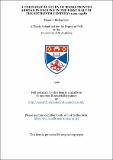Files in this item
A theological study of books printed abroad in English in the first half of the sixteenth century (1525-1548)
Item metadata
| dc.contributor.advisor | Cameron | |
| dc.contributor.author | Richardson, Fiona J. | |
| dc.coverage.spatial | 504 p. | en_US |
| dc.date.accessioned | 2018-06-05T11:14:38Z | |
| dc.date.available | 2018-06-05T11:14:38Z | |
| dc.date.issued | 1990-07 | |
| dc.identifier.uri | https://hdl.handle.net/10023/13723 | |
| dc.description.abstract | The English reformation, unlike that in Germany and Switzerland, evolved over a fairly long span of time. At first Luther's works were sold unchecked by English booksellers, being first prohibited in 1520. Over the next few years the advance of reforming ideas was considered so serious as to merit the further attention of the English Crown. By 1524 it was found necessary to enforce a law prohibiting the importation of theological texts into England, and efforts were made to suppress the further spread of the Protestant heresy throughout the realm. However, despite the Act of Parliament and a wave of persecutions the church was unable to stop the influx of prohibited books, which came off the printing presses of Germany and the Low Countries. With the aid of the revised version of the S.T.C. and additional catalogues of early printed writings, it has been possible to compile a list of foreign publications, all of which were intended for the English reader. These texts printed in the vernacular were written and commissioned by English writers forced into exile for their own safety, but also determined to establish Protestant Ideas In their own country. It is difficult to determine the exact numbers of Protestant books entering the country, but some Indication of their appeal can be found from the lists of prohibited books issued by the Ecclesiastical authorities. A detailed examination of these publications yields a clear picture of the theological teaching of Englands earliest Protestants. By carefully comparing these ideas with those of earlier heretics and contemporary reformers, it has been possible to assess the extent to which outside ideas has influenced the minds of these men. Further analysis has revealed the original and subtle genius of men who combined the ideas of the Continental reformers with those native to the English tradition, in order to produce a reformed theology which appealed to the unique situation in their own country. | en_US |
| dc.language.iso | en | en_US |
| dc.publisher | University of St Andrews | |
| dc.subject.lcc | BR377.B7R5 | en |
| dc.subject.lcsh | Reformation--England--Early works to 1800 | en |
| dc.title | A theological study of books printed abroad in English in the first half of the sixteenth century (1525-1548) | en_US |
| dc.type | Thesis | en_US |
| dc.type.qualificationlevel | Doctoral | en_US |
| dc.type.qualificationname | PhD Doctor of Philosophy | en_US |
| dc.publisher.institution | The University of St Andrews | en_US |
This item appears in the following Collection(s)
Items in the St Andrews Research Repository are protected by copyright, with all rights reserved, unless otherwise indicated.

